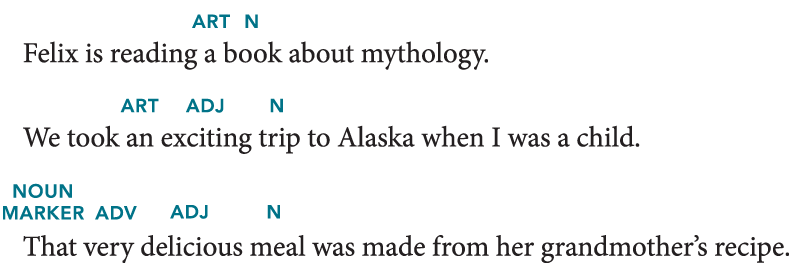Rules for writers, Tenth edition - Diana Hacker, Nancy Sommers 2021
Be familiar with articles and other noun markers
Articles (a, an, the)
Multilingual Writers and ESL Topics
Articles (a, an, the) are part of a category of words known as noun markers or determiners.
29a Be familiar with articles and other noun markers.
English uses noun markers to help identify the nouns that follow. In addition to articles (a, an, and the), noun markers include the following, which are covered in other sections of this book:
✵ possessive nouns, such as Elena’s (see 37a)
✵ possessive pronoun/adjectives: my, your, his, her, its, our, their (see 47b)
✵ demonstrative pronoun/adjectives: this, that, these, those (see 47b)
✵ quantifiers: all, any, each, either, every, few, many, more, most, much, neither, several, some, and so on (see 29d)
✵ numbers: one, twenty-three, and so on
Using articles and other noun markers
Articles and other noun markers always appear before nouns; sometimes other modifiers, such as adjectives, come between a noun marker and a noun.

![]()
In most cases, do not use an article with another noun marker.
![]()
![]()
Expressions like a few, the most, and all the are exceptions: a few potatoes, all the rain. See also 29d.
Types of articles and types of nouns
To choose an appropriate article for a noun, first determine whether the noun is common or proper, count or noncount, singular or plural, and specific or general. The chart in 29b describes the types of nouns.
Articles are classified as indefinite and definite. The indefinite articles, a and an, are used with general nouns. The definite article, the, is used with specific nouns. (The last section of the chart in 29b explains general and specific nouns.)
A and an both mean “one” or “one among many.” Use a before a consonant sound: a banana, a vacation, a picture, a happy child, a united family. Use an before a vowel sound: an eggplant, an occasion, an uncle, an honorable person. (See also 10d.)
The shows that a noun is specific; use the with one or more than one specific thing: the newspaper, the soldiers.